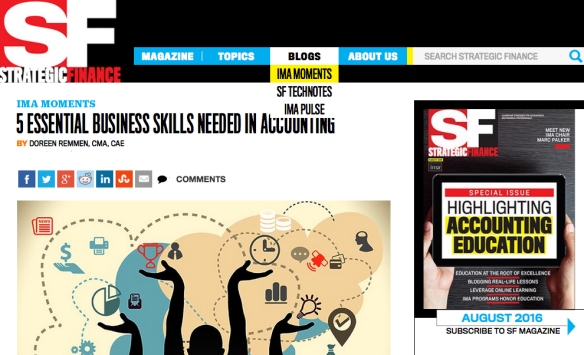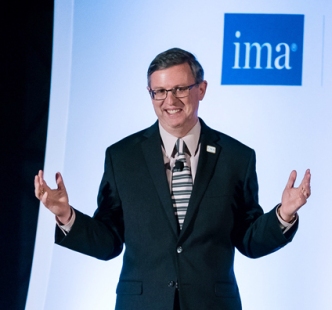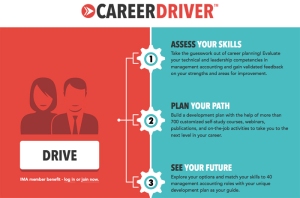
As IMA’s senior vice president of operations and CFO, I interview candidates for many positions in our organization, including our open accounting/finance positions. Over the years, I’ve realized that the most successful candidates for any job approach the interview the way a strong salesperson handles an important opportunity.
Like a salesperson landing the deal of a lifetime, you will have to “pitch” the technical skills on your résumé—your credentials, expertise with software, and ability to produce results—during an interview for an accounting position. Here are some practical tips that can give you a competitive edge.
1. Be polite to the receptionist.
He or she is the first of many “gatekeepers” you’ll meet. You’ll probably need to show the receptionist or security personnel your ID—so don’t leave your wallet in the car! Making a good impression on the receptionist won’t guarantee you a position with the firm, but if the receptionist doesn’t like you, others will hear about it, and your chances will be diminished.
2. Be on time for the interview.

Effective salespeople are never late to an important meeting. In fact, you should be a half hour early, and be gracious. The HR representative will insist that you fill out an application before anyone talks to you. Most companies use a form that asks for information not on your résumé, including salary history and reasons for leaving your previous positions.
Sometimes applicants with strong résumés balk at the application form—they want to go straight to the meeting with the executive team. This raises red flags; the last thing a firm wants is to hire a prima donna at any level.
3. Be accurate, thorough, and neat with the application form.
The form is a window into how well-organized you are and how neatly and accurately you’ll handle the reporting responsibilities of the Finance team. A recruiter once told me that whenever he was interviewing for controller positions he would walk the candidate to his or her car and take a peak inside. If the car were full of piles of junk, he wouldn’t present the candidate. Every salesperson knows that neatness counts. This is particularly true if you’re trying to land a job in accounting.
4. Prepare for the interview.
 Great salespeople invest in preparation for their meetings. The most important question I ask applicants is, “What would you like to know about our organization?” This is an invitation to engage in a dialogue and to demonstrate the work the candidate has done to prepare for the interview.
Great salespeople invest in preparation for their meetings. The most important question I ask applicants is, “What would you like to know about our organization?” This is an invitation to engage in a dialogue and to demonstrate the work the candidate has done to prepare for the interview.
The people with the best questions are those who have researched the history of IMA, the CMA program, our global membership network, and our products and services. A thoughtful compliment about our website goes a long way. People who have clearly spent time preparing for the interview, looking at the website, and thinking about questions they’d like to ask have the curiosity and drive we want on our team.
5. Ease awkward situations to establish rapport.
The best salespeople are as good at listening as they are at speaking. Once you’ve made it to the interview, you may realize that the hiring manager lacks interviewing skills. Don’t be judgmental; have compassion. He or she may be new to the role or may experience so little turnover on the team that interviewing opportunities are rare.
Also, many hiring managers find the interviewing process very stressful. If there are awkward pauses or if the interviewer runs out of questions for you, here is another salesperson’s tip: people love to talk about themselves. Ask questions about the interviewer’s own career path. Try to find out what motivates him or her and what challenges are trying to be solved. The goal is to establish rapport. Then you can turn back the conversation to the ways you can solve the interviewer’s challenges.
Sealing the Deal
Hiring managers are inundated with applications every time they post a job opening. If you are fortunate enough to make it through the initial screening process to get an interview, these 5 tips will increase your chances of landing the job. Only after incorporating these tips can you effectively “pitch” your product and close the deal by showing how your unique skills and abilities are the perfect fit.
Written by Doreen Remmen, CMA, CAE
RELATED ARTICLES
15 Interviewing Tips That Convert to Job Offers – Forbes
5 Interview Questions You Should Always Prepare to Answer – U.S. News & World Report
 Along with this transition comes a benefit: Each IMA Moments post will be announced via an SF Alert, our free e-mail updates that inform readers when new blog postings and magazine articles are published online. If you aren’t an IMA member or don’t already subscribe to SF Alerts, you can sign up to receive these free alerts at SFmagazine.com.
Along with this transition comes a benefit: Each IMA Moments post will be announced via an SF Alert, our free e-mail updates that inform readers when new blog postings and magazine articles are published online. If you aren’t an IMA member or don’t already subscribe to SF Alerts, you can sign up to receive these free alerts at SFmagazine.com.








 Fierce competition serves to benefit stakeholders with a relentless and unwavering emphasis on value and innovation. No one should drive in the rearview. In business, commoditization can be a kiss of death, while innovation and first-mover advantage can be business’s saviors on the path to sustainable growth and value.
Fierce competition serves to benefit stakeholders with a relentless and unwavering emphasis on value and innovation. No one should drive in the rearview. In business, commoditization can be a kiss of death, while innovation and first-mover advantage can be business’s saviors on the path to sustainable growth and value. Jeff Thomson, CMA, CAE, is IMA’s president and CEO. Undoubtedly, he has received much career advice throughout the years, but what stuck with him the most pertained to becoming a business partner:
Jeff Thomson, CMA, CAE, is IMA’s president and CEO. Undoubtedly, he has received much career advice throughout the years, but what stuck with him the most pertained to becoming a business partner:



 Great salespeople invest in preparation for their meetings. The most important question I ask applicants is, “What would you like to know about our organization?” This is an invitation to engage in a dialogue and to demonstrate the work the candidate has done to prepare for the interview.
Great salespeople invest in preparation for their meetings. The most important question I ask applicants is, “What would you like to know about our organization?” This is an invitation to engage in a dialogue and to demonstrate the work the candidate has done to prepare for the interview.


 Throughout the years, we’ve ensured an unwavering attention to integrity by using robust processes to ensure the questions on the CMA exam are psychometrically reliable, ensuring strong internal controls at testing centers, and committing to continuous improvement.
Throughout the years, we’ve ensured an unwavering attention to integrity by using robust processes to ensure the questions on the CMA exam are psychometrically reliable, ensuring strong internal controls at testing centers, and committing to continuous improvement.




 business cards. And don’t forget to follow up! Starting and sustaining a conversation with business professionals in your industry is an important way to grow, build your self-confidence, and expand your career horizons. So go ahead and mingle on!
business cards. And don’t forget to follow up! Starting and sustaining a conversation with business professionals in your industry is an important way to grow, build your self-confidence, and expand your career horizons. So go ahead and mingle on!